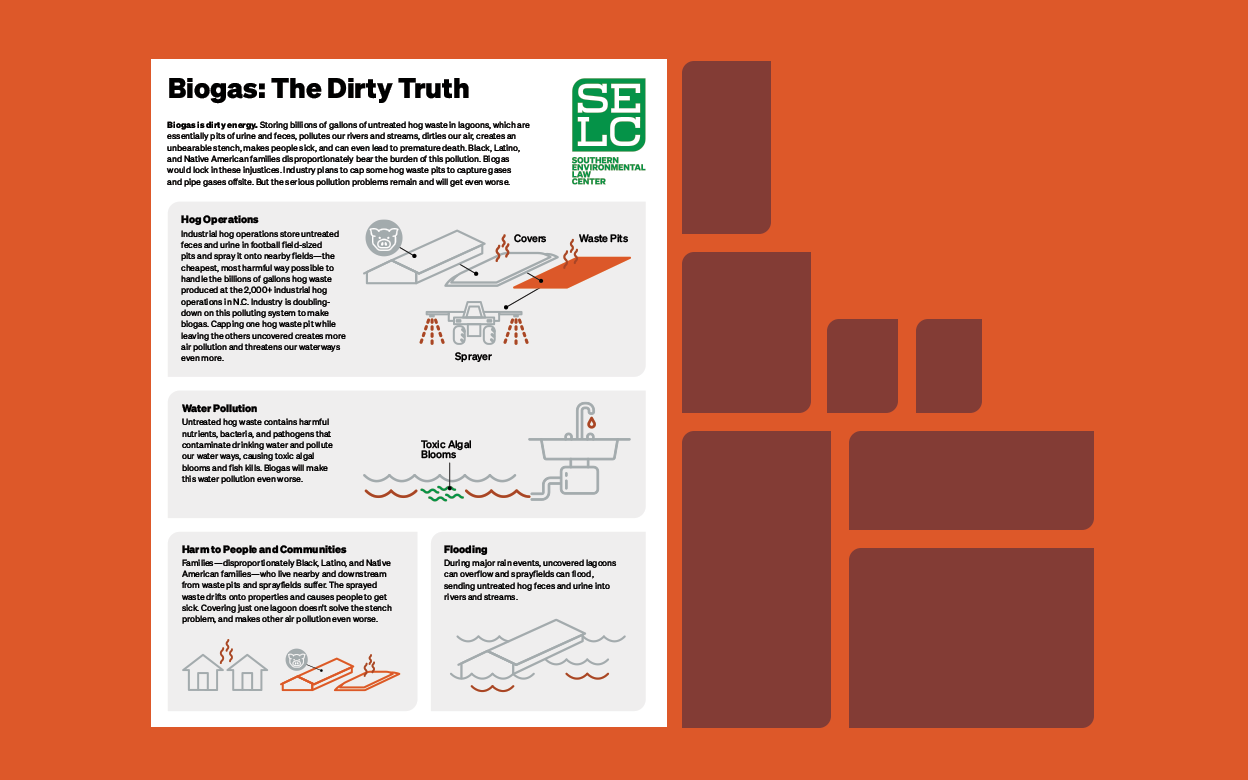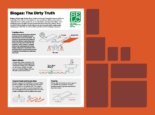Pollution from industrial animal operations
Industrial waste: hog & poultry
The Southeast has some of the largest livestock operations in the country. Georgia, Alabama, and North Carolina are three of the top four poultry-producing states in the United States. The top two hog-producing counties in the country, where hog outnumber people 30-to-1, are in North Carolina.
These animals are raised at thousands of industrial-scale operations, sometimes known as Concentrated Animal Feeding Operations or CAFOs. People living in communities nearby these industrial operations suffer from sickness and are burdened with air and water pollution that harm their health, quality of life and reduce their property values.
Industrial hog operations raise more than 10 million hogs, mostly in North Carolina’s low-lying, flood-prone coastal plain. These facilities continue to use a primitive lagoon-and-sprayfield system. In this system, large volumes of hog feces and urine are stored in open air, often unlined, lagoons and subsequently sprayed onto nearby fields.
Poultry facilities raise hundreds of millions of chickens and turkeys across the state, including the coastal plain of North Carolina where hog operations are also concentrated. These poultry facilities use an equally unsophisticated waste management system—chicken and turkey feces are stored in massive uncovered piles on the banks of rivers and streams and then spread across fields nearby.
Families have been dealing with contaminated water and unbearable odors from Smithfield’s hog operations for decades. Smithfield promised neighbors it would clean up its mess, and the law requires it to do so.
Maggie Galka, vice chair of the board of Environmental Justice Community Action Network
These industrial waste pits and piles, and waste-covered sprayfields, disproportionately harm communities of color, making the resulting pollution an environmental justice issue.

Biogas: The Dirty Truth
Pollution problems
Even on sunny days, hog and poultry waste pollute North Carolina rivers and streams, groundwater, and air, and expose neighboring communities to noxious odors and serious health concerns. Pollution from hog and poultry operations leads to toxic algae blooms that kill fish and other marine life and contaminate drinking water. Researchers recently found that residents living close to hog facilities are at higher risk for kidney disease, anemia, tuberculous, and other serious diseases.
During major rain events, including hurricanes, the pollution from these industrial operations is evident. In 2016 and 2018, two 1,000-year storms impacted North Carolina, leading to the release of millions of gallons of animal waste into floodwaters, streams, and rivers in coastal North Carolina. Countless animals died in the rising floodwaters. These facilities don’t belong in the most vulnerable and flood-prone areas of our state.
Protecting our water, air & health
Despite the well-documented pollution and devastating impacts these industrial operations have on communities and water, North Carolina has done little to address the problems. The Southern Environmental Law Center advocates for more accountability, transparency, and equity to reduce the risk of harmful pollution from these facilities and getting these facilities out of flood-prone areas. We also advocate that industry use available cleaner, more sustainable technology to manage the massive amounts of animal waste that pollute waterways and drinking water every day.
In response to a civil rights complaint, we filed on behalf of the Duplin County Branch of the North Carolina State Conference of the NAACP and the North Carolina Poor People’s Campaign, the U.S. Environmental Protection Agency agreed in 2022 to investigate the discriminatory impact of pollution and adverse health risks, including premature death, that industrial hog operations impose on Black and Latino communities in North Carolina.
In February of 2021, we challenged four state waste management permits for Smithfield-owned hog operations to use giant pits of untreated hog feces and urine to produce biogas while spraying the harmful waste on surrounding areas. In summer 2022, we challenged a one-size-fits all permit allowing any hog operation in the state to do the same. Both of these cases are pending in North Carolina state courts.
Wins for industrial animal pollution
Additional Resources

